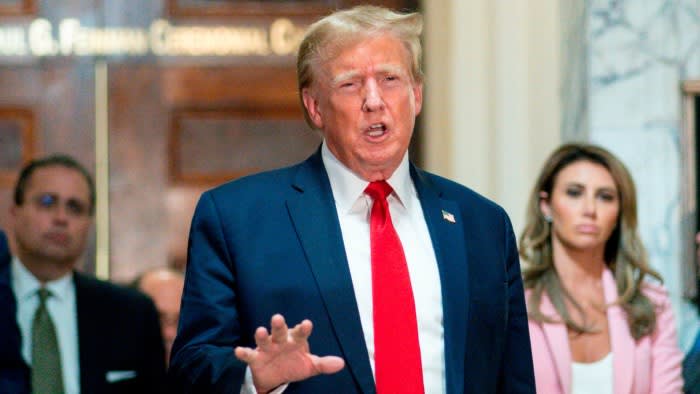Unlock the Editor’s Digest for free
Roula Khalaf, Editor of the FT, selects her favourite stories in this weekly newsletter.
The New York attorney-general has rejected Donald Trump’s claim that it was a “practical impossibility” to post a bond while he appeals against a nearly half-billion dollar fraud judgment, escalating the threat that the state will move to seize his assets as soon as next week.
In a court filing on Wednesday, Dennis Fan, a lawyer for the attorney-general’s office, argued that the former president could piece together a series of smaller bonds, or use his real estate portfolio to secure bank credit that could then back a surety bond.
“Defendants’ argument that obtaining a full bond is purportedly impossible is based on the false premise that they must obtain a single bond from a single surety for the entire judgment amount of $464 million,” Fan wrote, urging the court to reject Trump’s pleas for an extension.
The clock is running down on a 30-day grace period that Letitia James, the attorney-general, offered Trump after a New York judge last month ordered him to pay $464mn, including interest, for fraudulently inflating the value of his properties by billions of dollars over several years.
In what would be an extraordinary confrontation in the midst of a US presidential campaign, James, a Democrat, has threatened to seize Trump’s assets if he does not comply by Monday, which would deal a blow to the real estate empire upon which his fortune and brand name have been built. Trump’s lawyers have asked an appeals court to delay enforcement of the judgment.
Trump, the presumptive Republican nominee for president in the November election, issued a fundraising email to his supporters on Wednesday with the headline: “Hands Off Trump Tower!”.
A surety bond serves as a letter of credit to ensure that a defendant will pay a judgment if they lose the case on appeal. To protect themselves, underwriters will often ask for collateral that exceeds the amount of the judgment itself. They also charge an upfront fee of 1-3 per cent.
Trump’s lawyers told the court in a filing on Monday they had approached 30 large insurers but that none was willing to underwrite the bond. The problem, according to Alan Garten, general counsel for The Trump Organization, is that the insurers refused to accept real estate as collateral, instead demanding cash or liquid securities. Posting the bond would be a “practical impossibility”, Trump’s team told the court.
The state of the privately held Trump Organization’s finances is opaque. In a deposition last year, Trump said he had “substantially in excess of $400mn in cash”. He has since posted a $92mn surety bond for a separate legal judgment after he was found to have defamed the writer E Jean Carroll. That bond was underwritten by Chubb.
Gary Giulietti, an insurance broker for Trump, estimated his client would need to scrape together $557mn in cash equivalents and pay a fee of $18.5mn to cover a $464mn surety bond.
One bond broker, who asked not to be identified, believed that was feasible but that insurers had misgivings about dealing with the polarising former president. “It’s a political hot potato. No one really wants to get involved with this,” the person said.
Meanwhile, going through a bank could be costly for Trump. A letter of credit from a lender, backed by real estate, would carry a separate fee in addition to the premium for a surety bond.
Many lenders have long been wary of doing business with Trump based on his record of bankruptcies and his reputation for not paying bills. They may be more wary after the New York court’s ruling in the fraud case found that he had lied about the value of his assets.
“This is a pain game,” the broker said. “How painful is this going to be for him to do it?”
